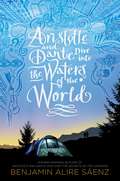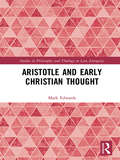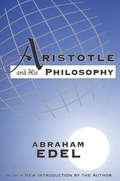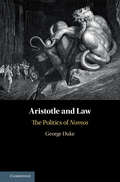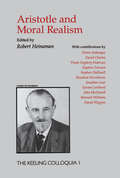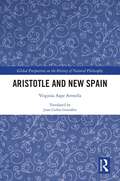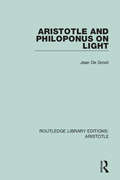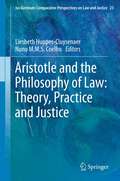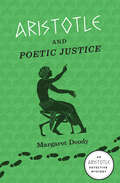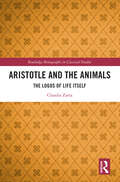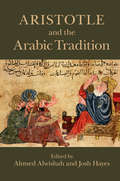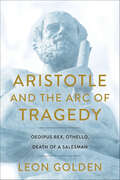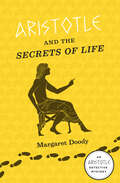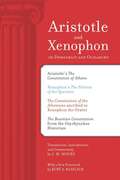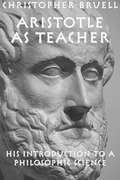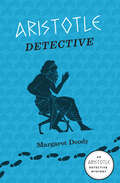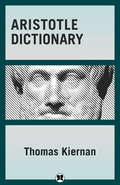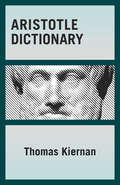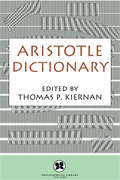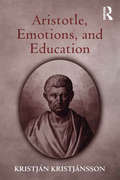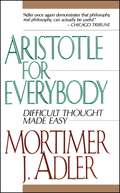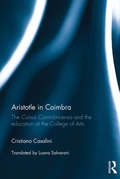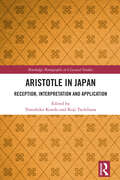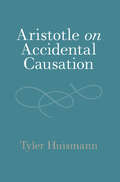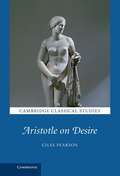- Table View
- List View
Aristotle and Dante Dive into the Waters of the World (Aristotle and Dante)
by Benjamin Alire SáenzThe highly anticipated sequel to the critically acclaimed, multiple award-winning novel Aristotle and Dante Discover the Secrets of the Universe is an achingly romantic, tender tale sure to captivate fans of Adam Silvera and Mary H.K. Choi. <p><p> In Aristotle and Dante Discover the Secrets of the Universe, two boys in a border town fell in love. Now, they must discover what it means to stay in love and build a relationship in a world that seems to challenge their very existence. Ari has spent all of high school burying who he really is, staying silent and invisible. He expected his senior year to be the same. But something in him cracked open when he fell in love with Dante, and he can’t go back. Suddenly he finds himself reaching out to new friends, standing up to bullies of all kinds, and making his voice heard. And, always, there is Dante, dreamy, witty Dante, who can get on Ari’s nerves and fill him with desire all at once. <p><p> The boys are determined to forge a path for themselves in a world that doesn’t understand them. But when Ari is faced with a shocking loss, he’ll have to fight like never before to create a life that is truthfully, joyfully his own.
Aristotle and Early Christian Thought (Studies in Philosophy and Theology in Late Antiquity)
by Mark EdwardsIn studies of early Christian thought, ‘philosophy’ is often a synonym for ‘Platonism’, or at most for ‘Platonism and Stoicism’. Nevertheless, it was Aristotle who, from the sixth century AD to the Italian Renaissance, was the dominant Greek voice in Christian, Muslim and Jewish philosophy. Aristotle and Early Christian Thought is the first book in English to give a synoptic account of the slow appropriation of Aristotelian thought in the Christian world from the second to the sixth century. Concentrating on the great theological topics – creation, the soul, the Trinity, and Christology – it makes full use of modern scholarship on the Peripatetic tradition after Aristotle, explaining the significance of Neoplatonism as a mediator of Aristotelian logic. While stressing the fidelity of Christian thinkers to biblical presuppositions which were not shared by the Greek schools, it also describes their attempts to overcome the pagan objections to biblical teachings by a consistent use of Aristotelian principles, and it follows their application of these principles to matters which lay outside the purview of Aristotle himself. This volume offers a valuable study not only for students of Christian theology in its formative years, but also for anyone seeking an introduction to the thought of Aristotle and its developments in Late Antiquity.
Aristotle and His Philosophy
by Abraham EdelIn this stunning act of synthesis, Abraham Edel captures the entire range of Aristotle's thought in a manner that will prove attractive and convincing to a contemporary audience. Many philosophers approach Aristotle with their own, rather than his, questions. Some cast him as a partisan of a contemporary school. Even the neutral approach of classical scholarship often takes for granted questions that reflect our modern ways of dissecting the world.Aristotle and His Philosophy shows him at work in asking and answering questions. Abraham Edel fashions a sound comparative way of using current analysis to deepen our understanding of Aristotle rather than argue with or simply appropriate him. Edel examines how Aristotle's basic ideas operated in his scientific and humanistic works, what they enabled him to do, what they kept him from doing, and what in turn we can learn from his philosophical experimentation.The purpose of this volume is twofold: to provide a comprehensive introduction to Aristotle's thought, and to throw fresh light on its patterned and systematic character. First, tracing the pattern in Aristotle's metaphysical and physical writings, he then explores the psychology, epistemology, ethics and politics, rhetoric and poetics. In the process, Edel discusses the way interpretations of Aristotle are built up and how different philosophical outlooks Catholic, Hegelian, Marxian, linguistic, naturalistic, and pragmatic have affected the reading of Aristotelian texts and ideas.The new introduction probes the general problem of interpreting a philosophy, and suggests how working through the different interpretations can contribute to a fuller understanding. This methodological self-consciousness makes Aristotle and His Philosophy markedly different from other studies of Aristotle. Martha C. Nussbaum of Brown University has described Edel as having "philosophical sensitivity and good sense throughout. His scholarship is comprehensive, but handled with grace and clarity."
Aristotle and Law: The Politics of Nomos
by George DukeIn Aristotle and Law, George Duke argues that Aristotle's seemingly dispersed statements on law and legislation are unified by a commitment to law's status as an achievement of practical reason. This book provides a systematic exposition of the significance and coherence of Aristotle's account of law, and also indicates the relevance of this account to contemporary legal theory. It will be of great interest to scholars and students in jurisprudence, philosophy, political science and classics.
Aristotle And Moral Realism: The Proceedings Of The First Keeling Colloquium, University College London, February 1994 (Keeling Colloquia Ser. #Vol. 1)
by Robert A HeinamanThe question of moral realismwhether our ethical beliefs rest on some objective foundationis one that mattered as much to Aristotle as it does to us today, and his writings on this topic continue to provide inspiration for the contemporary debate. This volume of essays expands the fruitful conversation among scholars of ancient philosophy and contemporary ethical theorists on this question and related issues such as the virtues, justice, and Aristotles theory of tragedy. }The question of moral realismwhether our ethical beliefs rest on some objective foundationis one that mattered as much to Aristotle as it does to us today, and his writings on this topic continue to provide inspiration for the contemporary debate. This volume of essays expands the fruitful conversation among scholars of ancient philosophy and contemporary ethical theorists on this question and related issues such as the virtues, justice, and Aristotles theory of tragedy. The distinguished contributors to this volume enrich and clarify both Aristotles views and the contemporary debates. This book makes an important contribution to both topics, and it will be essential reading for all philosophers and classicists with an interest in moral philosophy and Greek ethics.
Aristotle and New Spain (Global Perspectives on the History of Natural Philosophy)
by null Virginia Aspe ArmellaThis book is a detailed exploration of the Hispanic intellectual context and the different Aristotelian traditions that prevailed until the 16th century. Through a review and contextualisation of Aristotelian thinkers and texts, it argues that a unique Aristotelian tradition was formed in New Spain.The characteristic differences of Novohispanic Aristotelianism are a consequence of five factors: contact with the autochthonous cultures of America, the impact of the colonial organisation, the influence of the Salamanca humanist tradition, the presence of the Italian Aristotelianism of Renaissance translators in the university curricula and in the intellectual polemics of the time, and a peculiar assimilation of primitive and Old Testament Christianity in relation to indigenous people. This book analyses the works of Alonso de la Veracruz, Bartolomé de las Casas, Bernardino de Sahagún, Sor Juana Inés de la Cruz, Carlos de Sigüenza y Góngora, and Francisco Xavier Clavijero, reconsidering them in light of the history of ideas in New Spain and the contributions of Byzantine translators. It also offers a reflection on the problem of addressing Mexican colonial sources.This volume will be of interest to undergraduate and postgraduate philosophy students, as well as to researchers focused on Aristotle, Renaissance philosophy, or Latin American studies.
Aristotle and Philoponus on Light (Routledge Library Editions: Aristotle #3)
by Jean De GrootOriginally published in 1991. Philoponus’ long commentary on Aristotle’s definition of light sets up the major concerns, both in optics and theory of light, that are discussed here. Light was of special interest in Neoplatonism because of its being something incorporeal in the world of natural bodies. Light therefore had a special role in the philosophical analysis of the interpenetration of bodies and was also a paradigm for the soul-body problem. The book contains much about the physiology of vision as well as the propagation of light. Several chapters investigate the philosophical theory behind what came to be known as ‘multiplication of species’ in medieval light theory. These issues in the history of science are placed within an analysis of Neoplatonic development of the distinction between Aristotle’s kinesis and energeia. The book treats Philoponus’ philosophy of mathematical science from the point of view of matter, quantity, and three-dimensionality.
Aristotle and The Philosophy of Law: Theory, Practice And Justice (Ius Gentium: Comparative Perspectives on Law and Justice #23)
by Nuno M.M.S. Coelho Liesbeth Huppes-CluysenaerThe book presents a new focus on the legal philosophical texts of Aristotle, which offers a much richer frame for the understanding of practical thought, legal reasoning and political experience. It allows understanding how human beings interact in a complex world, and how extensive the complexity is which results from humans' own power of self-construction and autonomy. The Aristotelian approach recognizes the limits of rationality and the inevitable and constitutive contingency in Law. All this offers a helpful instrument to understand the changes globalisation imposes to legal experience today. The contributions in this collection do not merely pay attention to private virtues, but focus primarily on public virtues. They deal with the fact that law is dependent on political power and that a person can never be sure about the facts of a case or about the right way to act. They explore the assumption that a detailed knowledge of Aristotle's epistemology is necessary, because of the direct connection between Enlightened reasoning and legal positivism. They pay attention to the concept of proportionality, which can be seen as a precondition to discuss liberalism.
Aristotle and Poetic Justice: An Aristotle Detective Novel (The Aristotle Detective Novels #2)
by Margaret DoodyThe great Greek philosopher heads to Delphi on the hunt for a kidnapped heiress in this series of &“witty, elegant whodunits&” (Times Literary Supplement). 330BC: Alexander the Great has sacked Persepolis and won the greatest fortune the world has ever known. The night of the Silent Dinner, when Athens placates the spirits of the dead, passes with a creeping mist accompanied by eerie portents and a strange disappearance. Stephanos and his teacher, the philosopher Aristotle, are about to be drawn into solving the perplexing abduction case of Anthia, the heiress of a prominent silver merchant. All that is known is that the abductor and the heiress are on the road to Delphi and its ancient oracle—whose help may be needed when a murder complicates the case in this follow-up to the &“eminently enjoyable&” Aristotle Detective (Colin Dexter, author of the Inspector Morse Mysteries). &“Why did no one think of this before?&”—The Times (UK)
Aristotle and the Animals: The Logos of Life Itself (Routledge Monographs in Classical Studies)
by Claudia ZattaWith a novel approach to Aristotle’s zoology, this study looks at animals as creatures of nature (physis) and reveals a scientific discourse that, in response to his predecessors, exiles logos as reason and pursues the logos intrinsic to animals’ bodies, empowering them to sense the world and live. The volume explores Aristotle’s conception of animals through a discussion of his ad hoc methodology to study them, including the pertinence of the soul to such a study, and the rise of zoology as a branch of natural philosophy. For Aristotle, animal life stems from the body in the space of existence and revolves around sensation, which is entwined with pleasure, pain, and desire. Lack of human reason is irrelevant to an understanding of the richness of animal life and cognition. In sum, the reader will acquire knowledge of the "animal as such," which lay at the core of Aristotle’s agenda and required a study of its own, separate from plants and the elements. This book is intended for students of the history of science, ancient biology, and philosophy and all those who, from different fields, are interested in animal studies and the human-animal relation.
Aristotle and the Arabic Tradition
by Ahmed Alwishah Josh HayesThis volume of essays by scholars in ancient Greek, medieval, and Arabic philosophy examines the full range of Aristotle's influence upon the Arabic tradition. It explores central themes from Aristotle's corpus, including logic, rhetoric and poetics, physics and meteorology, psychology, metaphysics, ethics and politics, and examines how these themes are investigated and developed by Arabic philosophers including al-Kindî, al-Fârâbî, Avicenna, al-Ghazâlî, Ibn Bâjja and Averroes. The volume also includes essays which explicitly focus upon the historical reception of Aristotle, from the time of the Greek and Syriac transmission of his texts into the Islamic world to the period of their integration and assimilation into Arabic philosophy. This rich and wide-ranging collection will appeal to all those who are interested in the themes, development and context of Aristotle's enduring legacy within the Arabic tradition.
Aristotle and the Arc of the Tragedy: Oedipus Rex, Othello, Death of a Salesman
by Leon GoldenAristotle and the Arc of Tragedy is the latest of Leon Golden’s books to connect Ancient Greece to modern culture. In a world facing many pressing issues Classics professor Golden wants to champion the values and achievements of Classical Civilization. He asserts that Homeric Epic and Greek Tragedy are as relevant today as they were millennia ago because they are riveting and insightful studies of the human condition. Their universality grants them a contemporary relevance despite the passage of time and changes in custom and taste.In one of his previous books, Understanding the Iliad, Golden illuminated the relevance of The Iliad for modern readers. The Bryn Mawr Classical Review praised Understanding the Iliad because it, “achieves what it sets out to accomplish: to provide an interpretation of the Iliad that emphasizes its didactic aspects, its ability to improve its readers by presenting the spectacle of the evolution of a flawed warrior consumed by destructive anger to a legitimate hero who transcends his narcissism and grandiosity and reaches out to others and by doing so heals his own aching soul in the process.”Golden, making use of correspondence and personal contact with Joseph Heller, himself, argues convincingly in Achilles and Yossarian that Homer’s The Iliad exerted a profound influence over Heller as he wrote his modern classic, Catch-22. A Kirkus review acclaims Achilles and Yossarian in these words: “Golden combines impressive erudition with a sharp critical eye and a lucid prose style that laymen will find accessible and engaging. The result is an original and persuasive work of literary scholarship that finds much more than mere war stories in these classics.”
Aristotle and the Secrets of Life: An Aristotle Detective Novel (The Aristotle Detective Novels #3)
by Margaret DoodyThe great philosopher and his student face pirates, political intrigue, and more in this dark, suspenseful mystery set in ancient Athens. Tensions between the Athenians and the Makedonians—whose leader, Alexander the Great, is one of Aristotle&’s former students—draw the philosopher across the Aegean Sea, accompanied by the devoted Stephanos. Both will have much to learn about survival as they find themselves beset by pirates, uncovering conspiracy, and facing the horrors of war. It will be up to Aristotle to try to shed light on the darkness they are about to encounter—in this novel in the historical series praised as &“unusually authentic&” (Kirkus Reviews) and &“eminently enjoyable&” (Colin Dexter, author of the Inspector Morse Mysteries). Also published as Aristotle and the Mystery of Life
Aristotle and Xenophon On Democracy and Oligarchy
by J. M. MooreThis collection contains: Aristotle's "The Constitution of Athens"; Xenophon's "The Politeia of the Spartans"; "The Constitution of the Athenians" ascribed to Xenophon the Orator; and, "The Boeotian Constitution" from the Oxyrhynchus Historian. In bringing together, translating, and annotating these constitutional documents from ancient Greece thirty-five years ago, J.M. Moore produced an authoritative work of the highest scholarship. There is an explanatory essay by classics scholar Kurt A. Raaflaub that expands this indispensable collection.
Aristotle As Teacher: His Introduction To A Philosophic Science
by Christopher BruellThis book is an account of Aristotle's Metaphysics. The work is considered as a whole and each of its parts or books is taken up in the order that it has in the traditional text. The book is based on an examination of all of the manuscript readings reported in the three most recent editions of the work (those of Christ, Ross, and Jaeger), and it attempts in this way and others to come as close as possible to what would have been the original text. The Metaphysics is of course a much-studied work. What distinguishes this new effort to understand it is the working assumption that Aristotle presents in it his most comprehensive reflection on science: its character and aims, its foundations or presuppositions, and the obstacles or objections that constitute a challenge to its possibility. The book is thus intended to be of interest and use to at least two classes of readers: to those who have already reflected themselves on the nature of science and who have perhaps become dissatisfied with more recent attempts to establish it on a firm basis or to explain the basis on which it rests; and to beginning students who are willing to undertake a difficult task and who can be brought to see that science and philosophy were originally equivalent terms and that the effort to distinguish or separate them may have been deeply misguided. In other words, the book is meant to afford a glimpse into what philosophy originally meant.
Aristotle Detective: An Aristotle Detective Novel (The Aristotle Detective Novels #1)
by Margaret DoodyIn ancient Athens, the great philosopher applies logic to a lethal crime—in the &“eminently enjoyable&” first novel in a historical mystery series (Colin Dexter, author of the Inspector Morse Mysteries). Young Stephanos is desperate to save his family&’s honor by proving in the Athenian court that his exiled cousin is not guilty of shooting an arrow into a prominent patrician. For help, he turns to his old teacher—the cunning and clever thinker known as Aristotle. It will all lead up to a tense public trial in which Stephanos must draw on the rhetorical skills he&’s learned from his eccentric, brilliant mentor, in this novel filled with suspense, humor, and historical detail—the first in a series of &“witty, elegant whodunits&” (Times Literary Supplement). &“[An] unusually authentic Ancient-Greece murder tale.&”—Kirkus Reviews &“Doody brings the Athens of 322 BC to life with skill and verve…wonderfully plotted.&”—Publishers Weekly
Aristotle Dictionary
by Thomas KiernanAt long last a comprehensive tool in English for a better understanding of the most basic terms in Aristotle's philosophy. Interested readers, students and scholars of philosophy and of the general intellectual background of Western culture need no longer be handicapped by a lack of knowledge of Greek and Latin. A careful comparison of the original Greek, Medieval and Renaissance Latin translations and a reappraisal of English usage make this work a definitive source for the precise grasp of what has been the historical Aristotle as far as the documents permit one to judge. A lengthy introduction by Professor Theodore E. James presents an analysis of the major works of Aristotle.
Aristotle Dictionary
by Thomas KiernanAt long last, a comprehensive tool in English for a better understanding of the most basic terms in Aristotle&’s philosophy. Interested readers, students, and scholars of philosophy and of the general intellectual background of Western culture need no longer be handicapped by a lack of knowledge of Greek and Latin. A careful comparison of the original Greek, Medieval, and Renaissance Latin translations and a reappraisal of English usage make Aristotle Dictionary a definitive source for the precise grasp of what has been the historical Aristotle as far as the documents permit one to judge. A lengthy introduction by Professor Theodore E. James presents an analysis of the major works of Aristotle.
Aristotle Dictionary
by Thomas P. Kiernan Dagobert D. RuneAt long last a comprehensive tool in English for a better understanding of the most basic terms in Aristotle's philosophy. Interested readers, students and scholars of philosophy and of the general intellectual background of Western culture need no longer be handicapped by a lack of knowledge of Greek and Latin. A careful comparison of the original Greek, medieval and Renaissance Latin translations and a reappraisal of English usage make this work a definitive source for the precise grasp of what has been the historical Aristotle as far as the documents permit one to judge. Third Printing
Aristotle, Emotions, and Education
by Kristján KristjánssonWhat can Aristotle teach us that is relevant to contemporary moral and educational concerns? What can we learn from him about the nature of moral development, the justifiability and educability of emotions, the possibility of friendship between parents and their children, or the fundamental aims of teaching? The message of this book is that Aristotle has much to teach us about those issues and many others. In a formidable display of boundary-breaking scholarship, drawing upon the domains of philosophy, education and psychology, Kristján Kristjánsson analyses and dispels myriad misconceptions about Aristotle’s views on morality, emotions and education that abound in the current literature - including the claims of the emotional intelligence theorists that they have revitalised Aristotle’s message for the present day. The book proceeds by enlightening and astute forays into areas covered by Aristotle’s canonical works, while simultaneously gauging their pertinence for recent trends in moral education. This is an arresting book on how to balance the demands of head and heart: a book that deepens the contemporary discourse on emotion cultivation and virtuous living and one that will excite any student of moral education, whether academic or practitioner.
Aristotle for Everybody
by Mortimer J. AdlerAristotle (384 - 322 B.C.) taught logic to Alexander the Great and, by virtue of his philosophical works, to every philosopher since, from Marcus Aurelius, to Thomas Aquinas, to Mortimer J. Adler. Now Adler instructs the world in the "uncommon common sense" of Aristotelian logic, presenting Aristotle's understandings in a current, delightfully lucid way. He brings Aristotle's work to an everyday level. By encouraging readers to think philosophically, Adler offers us a unique path to personal insights and understanding of intangibles, such as the difference between wants and needs, the proper way to pursue happiness, and the right plan for a good life.
Aristotle in Coimbra: The Cursus Conimbricensis and the education at the College of Arts
by Cristiano CasaliniAristotle in Coimbra is the first book to cover the history of both the College of Arts in Coimbra and its most remarkable cultural product, the Cursus Conimbricensis, examining early Jesuit pedagogy as performed in one of the most important colleges run by the Society of Jesus in the sixteenth century. The first complete philosophical textbook published by a Jesuit college, the Cursus Conimbricensis (1592–1606) was created by some of the most renowned early Jesuit philosophers and comprised seven volumes of commentaries and disputations on Aristotle’s writings, which had formed the foundation of the university philosophy curriculum since the Middle Ages. In Aristotle in Coimbra, Cristiano Casalini demonstrates the connection between educational practices in a sixteenth-century college and the structure of a scholastic philosophical commentary, providing insight into this particular form of late-scholastic Aristotelianism through historiographical discourse. This book provides both a narrative of the historical background behind the publication of the Cursus and an analysis of the major philosophical and educational issues addressed by its seven volumes. It is valuable reading for all those interested in intellectual history, the history of education and the history of philosophy.
Aristotle in Japan: Reception, Interpretation and Application (Routledge Monographs in Classical Studies)
by Tomohiko Kondo Koji TachibanaThis is the first volume to explore the modern reception and contemporary relevance of Aristotle and his philosophy in Japan, making it a valuable contribution to both global Aristotelian studies and studies of Japanese philosophical traditions.The study of Aristotle’s philosophy in Japan is already over a hundred years old, yet the fruits of these efforts have mostly been published in Japanese and thus circulated almost entirely within Japan. Japanese scholarship, however, has not been conducted in isolation but rather has developed by keeping up with crucial contemporary trends in international scholarship. Aristotelian studies in Japan have therefore been neither particularly Japanese nor Far East Asian at first glance, which is one reason why they have not received much attention in Japanese philosophical literature. This volume addresses this gap, exploring the long historical struggle of Japanese people to read, understand and adopt Aristotle’s philosophy in a philosophical tradition different from the West. It also examines the applicability of Aristotle’s philosophy to contemporary issues and demonstrates the extent to which his philosophy remains relevant today, whether in the East or West.Aristotle in Japan: Reception, Interpretation and Application is of interest to students and scholars of Aristotelian philosophy, as well as those working on Japanese philosophy and classical reception.
Aristotle on Accidental Causation
by Tyler HuismannIn this major new study, Tyler Huismann connects Aristotle's natural philosophy to modern theories of causation and provides fresh interpretations of classic issues. He links two of the most important notions in Aristotle's philosophy, accidents and causes, and using the concept of accidental causation as a guide, argues for ground-breaking proposals on some of the most foundational areas of Aristotle's thought: the relation between substances and accidents, the nature of efficient causation, the workings of 'qua,' the possibility of uncaused events, and the role of accidental causation in the natural world. Structured around close readings of Aristotle's Physics and Metaphysics and informed by contemporary theories of causation, Huismann's book offers students an accessible treatment of some of Aristotle's core texts, and provides specialists with a series of provocative interpretations.
Aristotle on Desire
by Giles PearsonDesire is a central concept in Aristotle's ethical and psychological works, but he does not provide us with a systematic treatment of the notion itself. This book reconstructs the account of desire latent in his various scattered remarks on the subject and analyses its role in his moral psychology. Topics include: the range of states that Aristotle counts as desires (orexeis); objects of desire (orekta) and the relation between desires and envisaging prospects; desire and the good; Aristotle's three species of desire: epithumia (pleasure-based desire), thumos (retaliatory desire) and boulêsis (good-based desire – in a narrower notion of 'good' than that which connects desire more generally to the good); Aristotle's division of desires into rational and non-rational; Aristotle and some current views on desire; and the role of desire in Aristotle's moral psychology. The book will be of relevance to anyone interested in Aristotle's ethics or psychology.
